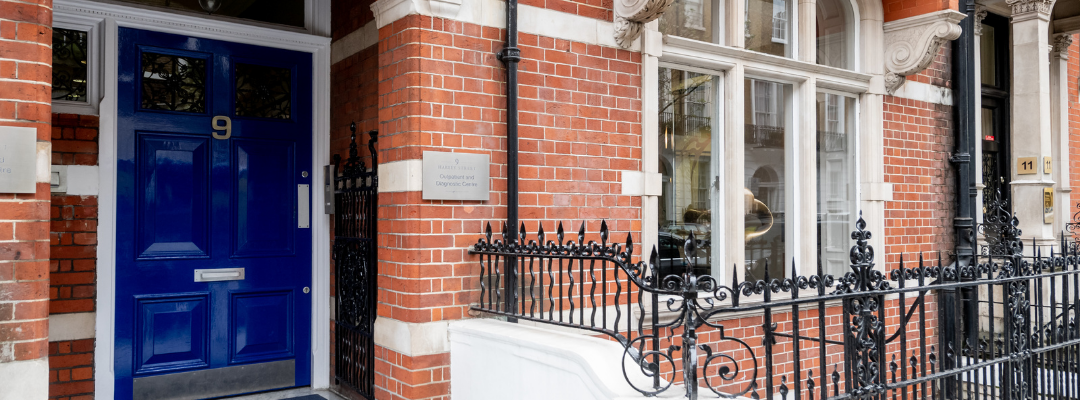Hernia Repair London
9 Harley Street is London’s leading surgical centre for hernia repair. Our specialist consultant team have successfully treated thousands of patients, restoring their daily function whilst removing discomfort and pain. Our cutting-edge facilities treat the full range of hernias, from epigastric to umbilical.
Drawing on decades of experience, our surgical consultants apply the latest techniques and methods to give the best possible patient results and outcomes. Our exceptional service starts with a private consultation to fully assess your symptoms before exploring the best options available for you.
What is a hernia?
‘To herniate’ means to pass through, and in medicine it usually refers to internal tissues or organs pushing through a weakness or gap in a muscular wall.
The condition produces little to no symptoms in most cases except for an apparent lump or bump under the skin. Further symptoms depend on the exact location of the hernia and how it has come about.
Hernias are not usually a serious condition, but they require surgical treatment in order to be repaired. A hernia that produces little to no symptoms today is always at risk of becoming troublesome in the future due to the lack of self-repair.
Seeking Medical Attention
If there is a sudden onset of pain from your hernia or it cannot be reduced (pushed back in) then you need to seek urgent medical attention. In these cases, it implies that the tissue of the hernia has become trapped and the blood supply may be cut off.
When dealing with an abdominal hernia it could be a sign of obstruction or strangulation. These terms refer to the blockage of the intestine and blood supply respectively. Both require surgical intervention in order to be treated.
What types of hernia are there?
The majority of patients who come to our clinic have abdominal hernias. This is due to the large sheet of muscles covering the abdomen which can be weakened by a number of factors from trauma to age. The hernia most commonly seen in our patients are:
Inguinal The most frequent cause of hernia, affecting men more than women, creates a swelling in the groin, the crease between your abdomen and thigh. In men it can travel through the inguinal canal of blood vessels and nerves to reach the scrotum.
Femoral Less frequently seen and more common in women, femoral hernia they appear in a similar position to inguinal hernia.
Umbilical Creating a bulge at your umbilicus, or belly button, umbilical hernia push through the natural weakness in your abdominal wall created by the loss of the umbilical cord at birth.
Incisional Previous trauma or surgery may have left scar tissue, weakening your abdominal wall and allowing protrusion of internal tissue.
Types of Hernia Surgery
Our surgical consultants constantly refine their approach to providing unparalleled hernia care in the UK. Striking a balance between effectiveness and invasiveness, they look to not only repair the hernia but strengthen existing muscles and return the results of herniation to their correct position.
Your surgery will be either:
Keyhole (laparoscopic)
Several small incisions are made to the abdomen whilst under general anaesthetic. Some gas is then used to inflate the abdomen so that the surgeon can safely operate and repair the hernia using a fibreoptic camera.
Open
A single, larger incision is made near the hernia so that it can be reduced (pushed back inside). This is also done under anaesthetic before being closed using stitches.
In both cases the surgeon may choose to use a mesh to help strengthen the part of the abdominal wall that has been affected. Your body will grow and repair, using the mesh as a base to make the area more resistant to herniation in the future.
Are surgical complications possible?
All surgery carries with it some inherent risk, something we work very hard to minimise in our theatre. With specific regard to hernia repair and surgery, we are proud to have reduced one of the main issues with this type of surgery – namely recurrence of the hernia.
As each hernia differs in size and shape as much as each person your surgeon will carefully go through your expected results and recovery after surgery. Our clinical team review every aspect of anatomy and medical history to ensure that your results are as beneficial as they are permanent.
What is the recovery time after surgery?
For patients with non-physical jobs, return to work is possible in as little as 7 days after surgery. In total, we expect most patients will have recovered in under 3 weeks. Depending on your hernia type and size you may be advised that your recovery time is slightly different.
All heavy lifting and twisting movements should be avoided for around 6 weeks to give the surgical site the best chance of success. Your surgical consultant will discuss with you any other recovery measures which they think may be beneficial for you.
Our core stomach muscles are used for hundreds of everyday tasks to ensuring proper rest as advised by your doctors is the best precaution to give your body time to heal and the affected muscles time to revive. This will reduce the likelihood of further hernias .



